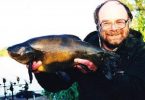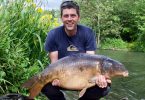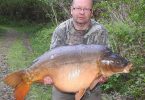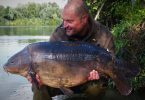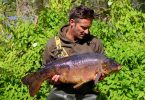Rambling
After my initial success using boiled baits and hair rigs, I thought I should perhaps try and catch some big fish, at this time twenties were still very desirable. Kevin Maddocks had recently published that in one season he had caught twenty twenties; this became the yardstick that carp anglers used for the next few seasons. I selected two waters to fish for my first season after bigger carp, one was an overgrown lake of about three acres and the other was the water I had caught the doubles from the previous season. The bait I chose to use was a milk protein base, flavoured with a mixture of maple flavour and clove terpines oil, sweetened with liquid saccharin. My intention was to fish one night per week right through the season at the overgrown lake, if it got too slow I could spend some time on the other water. I only had one night a week that I could fish and also Wednesday afternoons. By the end of the season I had caught fifteen twenties and forty two doubles. It was unbelievable, with the right rigs and bait I could now catch carp that I had once only dreamed of.
Nowadays, a season’s catch like that wouldn’t warrant mentioning, but at the time twenties were no where near as common as they are now. I no longer fish for numbers of carp, I like to find quiet waters and just fish for what’s in them. There are waters with a few nice fish in them that still haven’t been subjected to a lot of pressure from carp anglers but they are now few and far between. In those early days my ability to locate carp helped enormously Water craft isn’t something you can learn very quickly, like everything else you learn from the mistakes you make, as well as from getting it right. I’ve been sitting by lakes, pits and ponds for at least forty years; you can make a lot of mistakes in forty years. The most notable mistake I ever made was on a day ticket water near Canterbury. I had fished all day with two friends, Mark Gentle and Clive Ticehurst and we had caught nothing. As it started to get dark, I took a rod and landing net and had a walk round the back of some islands to see if I could stalk a fish. I couldn’t find any fish and started to walk back to my swim in order to cast out before the light went, as I was walking past a clump of weed in the margins I saw the head of a very big carp sticking out from under it. I very carefully lowered a bait down beside it, I lit a cigarette and waited patiently. After three hours I had smoked all my cigarettes, was feeling cold, soaking wet and so stiff it hurt to move’. I lifted my bait form the water, walked back to my swim and went to sleep.
Later that morning I woke up and rebaited my stalking rod and crept back up to the clump of weed. The carp was still there, although it didn’t look quite so much like a carp now that it was brighter. A closer examination was called for and creeping forward on my stomach through the wet grass revealed a bucket that was leant over making the rim appear elliptical, the half of it that projected from the weed looked just like a carp’s head.
If you ever want to check the credentials of a carp angler, point to a wind furrow and say, "That looks like a nice fish" and watch for their reaction. Quite often they will agree with you. Sometimes they will spend the next hour pointing to every bubble that rises in the vicinity of your swim to prove that they can spot them quicker than you. This isn’t quite the pointless bit of self indulgence it may seem, you can spend a lot of time trying to catch the fish you want and it helps to know if the information you get from other anglers is likely to be accurate.
After I had failed to catch the bucket, Brian came down to see us. He told me that he had found a pond with some nice doubles in it but could only catch them from one spot. I arranged to meet him down there after work later that week. I knew he would be there before me and as he had said that the fish could only be caught from one spot I didn’t see any point in taking any tackle. I went to the pond straight from work and sure enough Brain was already there and set up, I noticed his left-hand rod was cast in the direction of the oak tree that he had said was where he had caught the fish before.
"Where’s your tackle?" he growled.
"Haven’t got any bait" I lied.
"You’d better use one of my rods, which one do you want?" he asked.
"This one is nearest." I said sitting down next to his left hand rod. Before he could say anything the line pulled out the clip and roared off, I grabbed the rod and bent it into the fish. I played it as best I could, but with Brian shouting in my ear it managed to get round the wrong side of a bush in the margin. Brian eventually managed to paddle round and net it; a leather of about twelve pounds with blood veins visible all over its skin. We fished for another couple of hours but didn’t get anything else so Brian packed up and I helped him carry his tackle back to his van.
With my arms full I couldn’t quite get my leg over an electric fence, Brian held it down with his landing net handle and as I got one leg over I realised I had made a serious mistake. The wire slipped from under the handle and as it sprang up I jumped, but too late…the damage was done. I limped very slowly up the garden path when I got home and as I went in I found Clive sitting in the kitchen. He had built a couple of bite indicators and wanted to show them to me. The first was an antenna type alarm with an arm coming out the front of it that worked like a swinger, if the arm dropped slightly it closed a switch and the alarm sounded. The other was an arm also like a swinger that switched an alarm on with any movement of the line. We fished with both of them and, although they were very sensitive (if set up correctly they could detect the slightest tightening or slackening of the line), we decided that the inconvenience of re-setting them every time we had line bites or short pulls outweighed their benefits and returned to using optonics and monkey climbers. I am quite sure that with a bit of refinement these alarms could still be better than what is available today and a lot cheaper.
I took the arm on a cam alarms to a canal one afternoon to see how they would work on slow flowing water, I hadn’t been set up very long when two friends arrived and started float fishing in the swim next to me. The swims on this stretch of the canal are cut out at water level and you fish at the bottom of a six-foot steeply sloping bank. During the course of the afternoon we heard a commotion in the field behind us and climbing to the top of the bank we saw a young couple about ten yards from us. They had obviously thought they were alone and had stripped off and got to grips with each other, or rather he had been laid on his back and she was very athletically having her wicked way with him. It wasn’t only our eye-balls that were bulging! We had stood at the top of the bank for a few seconds when the girl saw us, one of the float anglers feeling a bit embarrassed did the only thing he could think of doing, he waved! She waved back and quite noticeably sped up, the float angler then shouted across to me, "Christ, that blokes got some stamina!" I climbed back down into my swim and collapsed
in fits of laughter, sometimes it’s nice to just get out in the fresh air. It was for the bloke with the all stamina anyway!
I had just started really getting to grips with carp fishing when both of my sons decided they would come with me, that put all my night fishing of out the window. We used to fish on Sundays and Wednesday afternoons and to be honest I enjoyed it. My oldest son, Scott, had a natural aptitude and caught quite a lot of doubles His younger brother, Jonathan, was the complete opposite. He would want to go home as soon as he had eaten all his food and would never spend more than a few minutes fishing without wanting to do something else. Nowadays, it’s all different. Scott doesn’t fish at all and Jonathan is very keen. He still doesn’t like fishing with his dad very much though. I don’t blame him really, like all kids he likes to chop and change, if I’m there I make him sit still and wait patiently and he gets bored.
Due to the time spent fishing with my kids, my friends started to fish new waters without me, so when my kids didn’t want to fish I went on my own. You always catch more when you fish on your own; you have the choice of swims and don’t make anywhere near as much disturbance on the bank. You will also fish quieter areas of the lake, in pairs or groups you tend to fish swims that are close to each other which are usually areas where the fish have had the most pressure put on them.
As the kids got older they found other interests and fished with me less, I started to fish Saturday nights again but the waters I had been fishing with the kids were really too easy. The pit had been the victim of very successful carp spawnings and it had become very easy to catch small commons. In fact, it was very difficult to avoid them. It wasn’t what I wanted and I stopped fishing it. I did have one last session on it with Mark where completely unaided I managed to lose the largest known fish in the lake. It was easy to do, I had recently bought some long range rods and reels and put a stringer set up on one of them and cast it as far as I could to see what the tackle could do. The lead hit the water and I put the rod on the optonic and put the monkey on the line, as I stood up the monkey rose up to the rod and dropped back down again. I thought it was a line bite until it did it again so I struck hard and the rod started to rhythmically bend and straighten, whatever was on the end was swimming in circles. I thought it was a large eel, of which there are a lot in this pit, and pumped it in as hard as I could. As it surfaced in the margin it rolled on its side and I could clearly see it was the upper twenty with the missing pectoral, I was so surprised I stopped pulling and the hook dropped out. If I had pulled it once more I would have beached it, this was the only chance of a big fish I ever had on this water and I messed it up completely.
The day ticket water where I had taken the kids and had first experimented with hair rigs had become incredibly easy. It was a good water for social fishing, though, as it was impossible not to catch carp from it. One year myself and a couple of friends had an end of season social at this lake and in one night I caught thirty nine carp weighing between eight and fifteen pounds. There were anglers on this water that struggled and seldom caught; they would all worry that their bait was no good, but I never managed to find a bait that the fish wouldn’t eat. The secret of catching the fish from this lake was to find hard spots on the bottom; most of the bottom is soft clay so most hard areas are where the carp have been feeding. If you fished on a couple of these hard spots and put a line of bait between the two baited areas you would never have to wait long for the takes to start.
It was at this lake that I first saw a new type of carp angler. These weren’t instant carp anglers, they were instant superstars. I don’t feel sorry for these guys though, I feel sorry for anyone who is unfortunate enough to have too much to do with them. When they arrive at a lake they stand and watch the water, striking a pose that suggests it’s all over for the fish. If a known successful carp angler is in the vicinity they proceed to stand in their bright white shirts right on the water’s edge of the said successful angler’s swim and loudly strike up a conversation, reciting long passages from whatever article they have just read. This is to let everyone within earshot know that they can converse on equal terms. From there, they strut back to their car and change into their designer costumes. They then, rather like Chris Eubank about to do battle, strut with a set of designer luggage to their chosen swim, usually the one with the most obvious amounts of gas bubbles rising to the surface. On arrival at their chosen swim they proceed to set up. After throwing everything on the ground, their tackle is assembled. This is either chosen to replicate the set up of a successful angler on the water or is the most expensive they can afford. It is never chosen to suit the relevant circumstances. Bank sticks and bivvy pegs are hammered in and finally both rods are cast in the general direction of two known feeding spots. If a third rod is allowed, it is cast into the margin. Four handfuls of particle are thrown around the margin bait and fifty boilies are launched towards each of the other baits. A marker rod is then taken from his holdall, matching the other three rods in every respect, and the swim is plumbed to see if anything has been missed. Anyone unfortunate enough to be fishing too close is subjected to a recital from the catalogue of the superstars chosen bait manufacturer. The conversation then changes to slagging off anyone who is being successful on that particular water. The accusations made vary from using boats at night to secret drugs being put into the bait with a thousand variations in between. The listener is left in no doubt whatsoever that anyone that has been successful on the water has pulled strokes, which of course leaves superstar as the best angler on the water as he has stuck religiously to the rules and in just three season’s has caught six small carp. Although they do sometimes exaggerate both size and numbers of fish caught or imply that despite never having been seen to catch anything they have managed to keep their phenomenal catches a secret. These people will never be good anglers, it is not in their nature to work at anything, they see everything in financial terms and are always looking for short cuts to success. They will spend a small fortune on bait but will not invest one minute in learning how to use it properly. Nowadays, there are designer waters that have been overstocked with large carp where these people can catch a few fish. I hope they fish them forever!
The overgrown water was still a good prospect, it was quite hard and the other anglers on the water were quite good, they were also very careful to look after their fish. I decided to continue fishing there but didn’t really want it as my main water as had caught most of the fish from it, so I spent the next two seasons fishing a variety of waters. It was by doing this that caused me to learn a lot more about bait application, every water responds differently but the section written on ground bait techniques in "The Cam Strikes Back" by Rod Hutchinson contains all the ground rules.
The first water I fished was a small, deep lake that was surrounded by reeds. I still had a lot of confidence in milk proteins but its use is very limited. For catching fish that are solitary or move about in small groups, it is an excellent ambush bait, but for large groups of fish it is not
so good. To put the quantity in that is needed to draw numbers of fish to your bait can cause the ammonia problem previously mentioned; it is also very expensive. The fish in this water were never seen in groups of more than three or four fish and so I chose the protein bait. By baiting a ledge in about eight feet of water in one corner of the lake with about a pound of boilies, I caught two or three fish up to about twenty pounds every night I fished it. I would also put about half a pound of boilies in the same area on a Wednesday lunchtime and fish until dark, usually catching one or two fish. The fish in this water didn’t like people at all. On an afternoon session I sometimes had the first take while I was setting up, but if I was staying longer and put a bivvy up, the disturbance meant that I would have to wait as long as twelve hours for the first take. Another strange thing was that all the time I was putting protein baits in no one else ever had a take. I improved on the number of fish caught on longer sessions quite simply by walking to my swim through a field rather than walking round the banks. There is no way round this disturbance on water where other anglers constantly walk round the banks unless you own a high power rifle complete with silencer, of course!
I wanted to try a different type of bait on this water, one that would hopefully produce more takes. I made a fishmeal and used fish oil to take the stickiness out of it, I also added liquid molasses, saccharin and a small quantity of ethyl butyrate. The first time I used the bait was on an afternoon session. I didn’t catch anything, but did have a couple of line bites. I went back to the lake on the Saturday and spread a couple of pounds of boilies from my usual spot along the front of a reed bed to a point about thirty yards along the bank. I cast a rod to each end of the feed and a third rod into the middle of it. Through the course of the day I caught six carp to nineteen and a half pounds and lost another, I put a further two pounds of boilies out while catching the fish and eventually ran out of bait.
The woman who owned the lake had a son, John Smith, who took over my swim when I went home in the evening. Despite having line bites all night, he caught nothing. He had actually gone two months without getting a take and continued to blank until he ran out of day-glow dye a couple of weeks later. He had tried various baits, but had dyed them all orange. When he ran out of dye, he made his bait without it and immediately started catching. It may well have been coincidence, but I have never used artificial colours in my bait since. Speaking of colours, they were originally used to change the appearance of baits that were starting to fail. Experiments that have been done with colours have shown that small carp appear to be sight feeders and pick up bright coloured baits quite quickly. As carp get older their receptors improve in performance, so a large carp can detect baits in water quicker than a small one. If you make your baits a drab colour that blends in with the bottom and keep the additive levels low, you should over the course of a season improve the average size of the carp you catch. These drab coloured baits don’t receive as much attention from water birds as bright ones, so I now use them exclusively.
One February night, I was fishing this lake with John when he had a real screamer. As he got out of his bivvy and picked up his rod, he slid down the bank and slowly sank up to his neck in the water. It all happened in slow motion and would have been very funny if I hadn’t heard the cat ice cracking as he went through. In the circumstances I didn’t laugh until he got out. It was a good job he lived at the lake; he went home and got changed and was back in his swim within thirty minutes.
During the time I was fishing the lake Johns’ mother ordered four carp from a fish farm as a birthday present for him. They arrived on the coldest day of the year; the lake was completely frozen and the ice took some breaking before the fish could be put in. I knew as well as the driver that the fish had little chance of survival, and when the ice thawed we found two fifteen pound mirrors and a twenty- eight pound leather dead. The other fish, a little leather, survived and packed on weight. It grew to about twenty pounds very quickly. There was no comeback on this incident, the solicitors advised that it would be impossible to prove that the fish farmer knew the fish could die in those conditions. The fact that one fish survived would be used as his evidence that the conditions the fish were transferred in were not overly harsh. That little leather died a couple of years later when it was transferred to another lake by another fish farmer; it died during transit!
I fished several other waters for bigger fish while fishing this lake, but spent most of my time fishing this little water. A few others had permission to fish it, we always had a good time and there were no competitive attitudes until Mr Crabtree arrived. Not only had this person modeled his entire set of tackle on the old Bernard Venables character, but he looked just like him. He even smoked the same type of briar pipe and fished with a young friend called Peter. I blotted my copy book with him instantly by telling him that he wouldn’t need his treble hooks as the carp in this lake didn’t like potatoes. He told lies of outlandish proportions and it became difficult for the other anglers fishing the lake to keep a straight face when listening to him.
One morning I arrived after he had fished a night with no one else on the lake, he told me that he had caught a common of forty-three pounds fifteen ounces. He then told me that he thought his scales weighed a bit light and had thought of phoning the London Zoo just in case, but had decided against it as he didn’t want to disturb the people in the house. When he told me he had put it back, I said "Presumably to become a fifty-pounder". He realised I had definitely read the script before and never spoke to me again.
He did speak quite a lot to Johns’ mother though; he would always bring her chocolates, flowers or a bottle of sherry. Watching him try to oil his way into her affections was a source of amusement second to none, he made his big mistake when thinking that he was getting somewhere put his arm around her and caused her Alsatian to attack him. She told him to leave the property and not to return. She hadn’t objected to him touching her, she just didn’t like the way he had upset her dog.
Her Alsatian was the biggest one I had ever seen it was usually quite friendly, but guarded her quite jealously. It had a sense of humour though, and if it ever saw anyone struggling with their tackle it would always run into them and knock them over. One evening, Johns’ mother brought home a new dog, a Chihuahua. It snapped at her as she tried to pick it up and that was its lot, the Alsatian ate it! As Johns’ mother tried to retrieve her new dog from the Alsatian’s throat, a bird cage got knocked over and as the budgie staggered from the wreckage it ate that too! There was never a dull moment at that lake. The vet said that eating live meat wouldn’t hurt the dog and it had probably done it because it was broody. There isn’t a dog in the country brave enough to rectify that situation! The fishing at that lake finished when John and his mother moved to a new house. There was a pond at their new property and the lake was netted. Only half the carp were removed, the twenty fish that were left have probably grown quite big by now.

